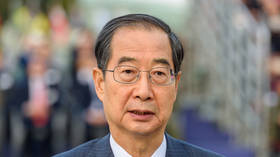Will Biden finally be the president who closes Gitmo?

Twenty years ago, the infamous Guantanamo Bay detention camp as we now know it saw its first detainees from the War on Terror enter. Will President Joe Biden, at long last, shut it down?
In the wake of the 9/11 terrorist attacks, the Guantanamo Bay detention camp, or Gitmo, was established in its current iteration by former President George W. Bush to detain alleged terrorists. It has since been the focus of international outrage, including countless reports and several documentaries, because of extraordinarily well-documented allegations of torture and mistreatment of detainees.
Detainees have reported beatings, forced drugging, sensory deprivation, stress positions, molestation, and horrifying psychological abuse. One of the most famous accounts, which depicted the Tipton Three, three British Muslims who were detained and released from the camp, was in the 2006 British docudrama, ‘The Road to Guantanamo’.
In light of the international backlash to the camp, former president Barack Obama, who Biden served under as vice president, made closing Guantanamo a key issue when he first entered office, saying that he would close it within his first year. However, Obama only managed to cut the camp’s operations after a stern bipartisan political backlash in Congress.
Today, there are still 39 detainees left – a far cry from the 780 total that have been detained in the camp, but still too many considering only 11 have been charged with crimes after nearly two decades in custody.
For all intents and purposes, Biden appears to be on a similar course to Obama after the years of former President Donald Trump saw almost no progress on scaling down Gitmo. He has pledged to shut it down and the administration consistently mentions “ongoing efforts” to close the camp but has not taken any serious steps in that direction, except for repatriating their first detainee, Abdul Latif Nasser, a Moroccan man who was never charged with a crime, in late October 2021.
In fact, it was recently reported that the Pentagon is building a second facility courtroom, which should be operational mid-2023 and will not allow in members of the public. This obviously implies the camp will still be open for some time.
Biden’s team obviously wants to scale down Guantanamo, in principle, by releasing detainees that are not seen as serious threats, but it also wants to avoid being seen as soft on national security issues – especially after the retreat from Afghanistan. It does not want to be the administration that closed the camp in fear of the possibility that, perhaps, international terrorism surges and Republicans point to the closure of Gitmo for an explanation.
In lieu of this, it is using a more low-key strategy to wind down. For example, Obama had tasked a special envoy with negotiating deals with other countries to hand over low-level detainees. As shown by Latif Nasser’s transfer, the Biden White House is handling this through the diplomatic corps, including the State Department’s Bureau of Counterterrorism.
This may be so the administration can avoid the same visibility that Obama’s team had, which worked to their disadvantage, or it could be because the administration does not see it as a priority. Reading the context of this situation, the intentions of the administration are probably a combination of these two.
However, the problem with this tip-toe approach is that, for one, a rate of one prisoner repatriated per year is ridiculous – and, most importantly, it undermines the Biden administration in several ways.
First of all, Biden said in his speech announcing the end of the war in Afghanistan that the US needs to adapt to today’s threats and move past those from 20 years ago.
It is widely acknowledged that Gitmo has been an abject failure, has not actually netted any consequential results for US intelligence and is nothing more than a blight on the country’s already spotty human rights record. That’s why Bush released more than 500 detainees during his term and why Michael Lehnert, a now-retired Marine Corps major general who was tasked with opening the detention center, is one of its biggest critics.
On this note, another key point is that the Biden administration has pledged a human rights-centered foreign policy approach, which it contrasts with its rivals, but the continuation of Gitmo is bold-faced hypocrisy.
Just last week, US Secretary of State Antony Blinken, while announcing travel bans on eight Cuban officials, accused them of being involved “in attempts to silence the voices of the Cuban people through repression, unjust detentions and harsh prison sentences.”
It makes Biden’s Cuba policy look ridiculous when his team accuses Havana of “unjust detentions and harsh prison sentences” while literally operating an arbitrary detention/torture complex on the same island. But there are countless other examples one could think of, including Biden’s “diplomatic boycott” of the 2022 Beijing Winter Games over alleged human rights abuses.
While it may indeed be true that Republicans (and some Democrats) would be riled up by serious attempts to close Gitmo once and for all, its existence at a time when the US is trying to consolidate its global hegemony on the mantle of human rights is fundamentally absurd and cannot be ignored. It inherently undermines the values that the US claims to uphold.
If not out of principle, the Biden administration should at least finally close Gitmo, 20 years on, based on this fact.
The statements, views and opinions expressed in this column are solely those of the author and do not necessarily represent those of RT.

















